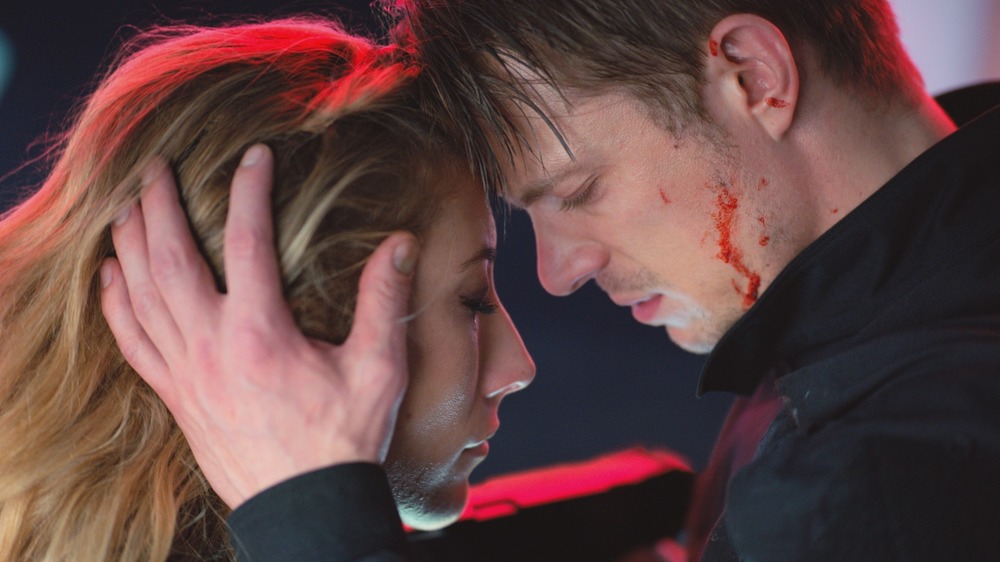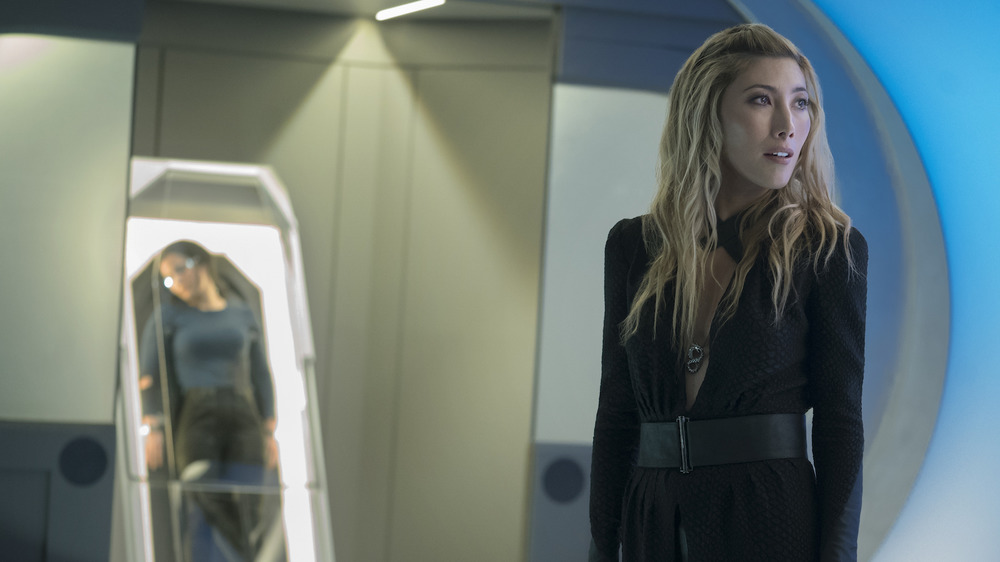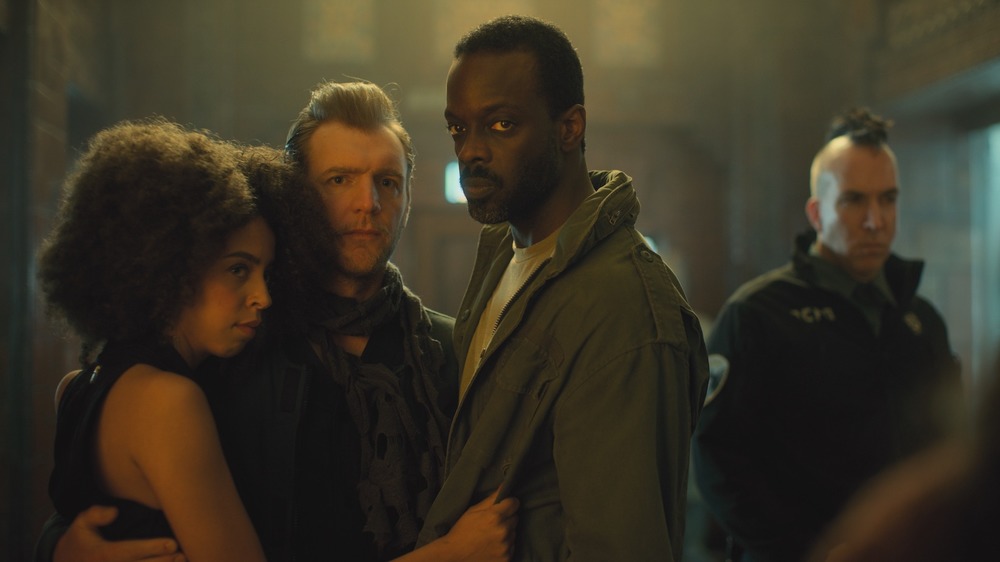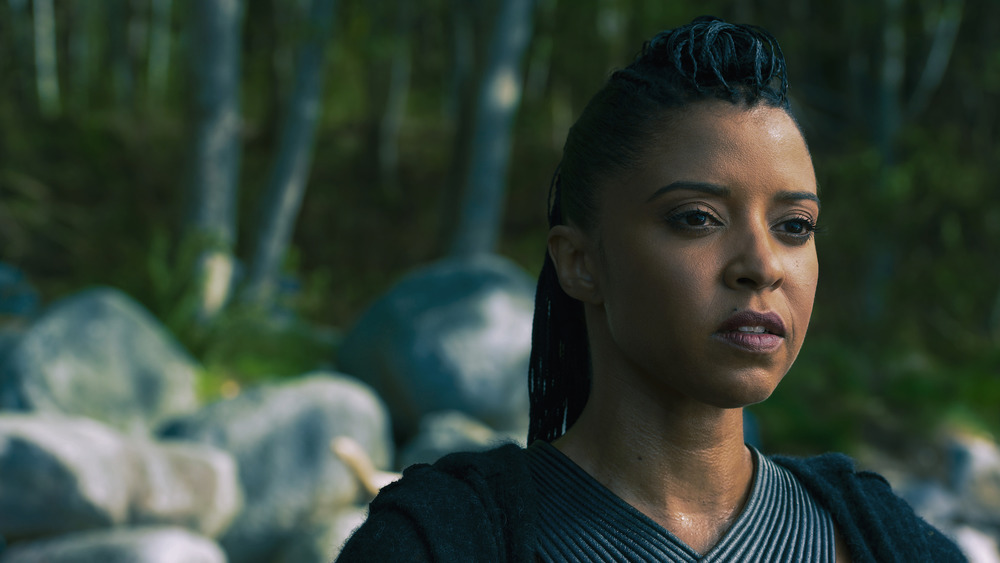The Dark Part About Altered Carbon Everyone Ignores
Netflix's sci-fi series Altered Carbon, based on the novel by Richard K. Morgan, takes place over 360 years in the future, in a world where technology has developed to allow for immortality. Consciousness can now be transferred into a piece of technology called a "stack," and then transferred into a new body. Focusing on a character named Takeshi Kovacs — played by Joel Kinnaman in season 1 and Anthony Mackie in season 2 — who is a reincarnated super soldier called on to solve a murder, the series uses this plot to explore many darker topics, like exploitation, class differences, and the concept of ownership.
While the main character may be Kovacs, the show features a supporting cast filled with dynamic and capable women, starting with Quellcrist Falconer, played by Hamilton's Renée Elisa Goldsberry. Quell, as she is called, is a brilliant leader of the Envoy rebellion and an intelligent engineer, having created the stack technology that fuels society. Seeing the manipulation going on, she vows to destroy that same technology and free the world from the oppression. Altered Carbon, which was sadly cancelled after two seasons, is an expansive and intense adventure, but it delves into some really dark issues that fans tend to forget about. In particular, creator and showrunner Laeta Kalogridis focused on violent crimes against women, unafraid to show it in all its brutality.
Altered Carbon examines violence against women in this world
To some fans, Altered Carbon's plotline revolving around violence against women may seem gratuitous or unneeded, but in reality, the show's portrayal of this is a huge part of Altered Carbon's feminist perspective. Past, present, or future, sexual violence has sadly always been a central part of society. For Kalogridis and Altered Carbon's cast, this was an important subject to explore, as long as it was done with women at the helm and great care.
In a 2018 interview with Indiewire, James Purefoy, who plays Laurens Bancroft, explained that in Altered Carbon's universe, "violence against women has not ceased just because 350 years have passed." The series is unafraid to show the horrors of the future, both in the twisted uses of technology, and how issues like sexism have changed within the new environment. For Bancroft, a major perpetrator of this, the only line he can't cross is murder, but that doesn't mean he won't hurt women for his own pleasure. He can always buy them a newer and better body, so he sees nothing wrong with it.
But along with showing the worsts of this world, especially through the storyline of Lizzie Elliot (Hayley Law), driven crazy from her experience at the hands of Bancroft and his wife (Kristin Lehman), Kalogridis crafted a story that presents women adapting and overcoming these horrific situations, like with Lizzie's brutal yet cathartic rampage for revenge. Turns out stack technology has a few benefits.
Show creator Laeta Kalogridis presents a feminist perspective to this reality
In order to portray these tough topics with nuance and the correct perspective, Kalogridis made sure that key scenes — such as the battle between the naked clones of Reileen (Dichen Lachman) and Kristin Ortega (Martha Higareda) in "Clash by Night"— were directed by women. In this case, Uta Briesewitz was behind the camera. She has worked on shows that explore similar themes like Jessica Jones, Orange is the New Black, and Westworld, the last of which has extremely similar themes of women fighting for control and ownership of their own body.
According to Kalogridis, crafting the clone fight scene was about wanting "to create something that isn't usually done with female bodies, which is to see them as belonging to the woman totally. That whole sequence is not about the male gaze. There's not a dude in the scene." Reileen "is an embodiment of a certain kind of unstoppable, and yet completely understandable, will to survive. And she owns herself completely. Her nudity is not about anyone else. It's who she is." Commenting on the process of filming this scene, Lachman stated that the nudity wasn't an issue. It was fighting with the fake glass on the ground and moving around so much that was difficult. She said that "there were so many other brave women who chose to be there with me, and that also made it easier," and that "having a female director was a great blessing."
Altered Carbon portrays these difficult stories with honesty and care
This sort of story, and these scenes in particular, are definitely difficult to portray correctly. While some see a scene like the clone fight as offensive solely because the clones are female and naked, it's clear that the camera isn't showing this as a visually stimulating image. Instead, it has a real function, establishing key ideas about the character and what sort of person she is. As Purefoy put it, it's about "perspective and context." Altered Carbon never backs down from exploring the true horrors of humanity, not leaving anything out. But through the careful and honest design of characters like Quell, Ortega, and Lizzie, Altered Carbon's violence against women has a true purpose in the story.
In the same Indiewire interview, actress Higareda commended Kalogridis's skill in crafting stories about women and for women, saying that the show's creator "wanted to make sure that every single one of the female characters was strong. And determined. Not only that way, a strong female character, but very well-rounded." Fans can see this in Higareda's own multi-faceted character, Ortega, who "speaks her mind and [is] all about justice, but she's also very vulnerable when it comes to her family."
Through the show's storyline and female characters, Altered Carbon successfully adds something intelligent and worthy to the conversation of sexism and privilege, both on screen and in the real world.



